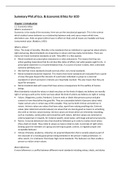Summary
Summary Phil.of Eco. & Economic Ethics for ECO
- Course
- Institution
This is a summary of the course Philosophy of Economics & Economic Ethics for ECO from Tilburg University. It contains a summary of the mandatory reader 'Markets and Morality: On Economic Freedom, Happiness, Inequality and Virtues', written by the lecturer Johan Graafland and the lectures. The su...
[Show more]





